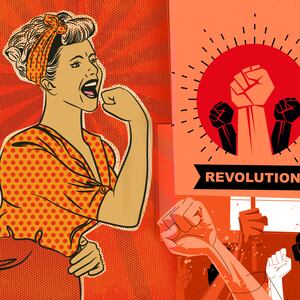The U.S. economy is chugging toward a new record for longest expansion, and middle-class families, finally, are seeing decent wage gains. Yet our political leaders, as if stuck in a time warp, keep peddling a bleak narrative of economic victimhood and defeatism.
Populists tell U.S. workers “global capitalism” is rigged against them. Sen. Elizabeth Warren calls for breaking up “big tech” America’s most innovative companies—because they are, well, just too big. Among millennials, socialism’s stock is soaring. Even some prominent libertarians are defecting from the free market camp and learning to love the welfare state.
What a change from the 1990s, when nearly everyone seemed certain that socialism was dead and buried and democratic capitalism reigned supreme around the world.
The economic gloom enveloping the nation’s political, academic and media elites trickles down to the public at large. According to a new Pew survey, Americans today are strikingly pessimistic about the future. They see the United States as declining economically, growing more unequal and becoming even more divided politically. Whatever happened to Americans’ native optimism?
They’ve been sideswiped by three disruptive developments. The first is the advent of a globally connected knowledge economy, which has taken a toll on blue collar America. Second, market democracies in this century got stuck in a slow growth/high inequality rut, while autocratic China surged ahead. The rancid cherry on top of these structural changes was the Great Recession of 2007-2009, intensified by the housing crisis and Wall Street’s near meltdown.
This perfect economic storm has swept away middle-income jobs, slowed productivity and wage gains and undermined the traditional foundations of working- and middle-class security, especially in the Rust Belt and rural communities. It’s also created a ton of new technology and wealth, while delivering lopsided rewards to highly educated and cosmopolitan elites. Mix in the combustible new politics of immigration and identity, and you have a surefire formula for political radicalization, from the Tea Party and Trumpean nationalism on the right to Sen. Bernie Sanders and the neo-socialist left.
Buffeted by these ideological crosscurrents, it’s easy to lose your political bearings. Yet while Donald Trump may hate free trade, and millennials may get a transgressive rush from posturing as “democratic socialists,” most Americans haven’t lost their deep-rooted faith in economic freedom, individual enterprise and market competition. A Gallup poll last year, for example, found that the public overwhelmingly (79 percent) expresses a favorable view of “free enterprise.”
“Capitalism” doesn’t fare so well, especially among young people. Nearly half of millennial and Generation Z respondents in a recent Axios survey said they prefer living in a socialist country. Such attitudes likely are a spasm of protest against the diminished economic prospects facing young Americans, especially the 60 percent who don’t have a college degree. They’ve experienced a shrinking pool of stable, middle-income jobs, stagnant or falling wage growth, escalating student debt and exorbitantly high college and housing costs.
But let’s keep things in perspective. Previous generations endured much harder economic times, yet they didn’t jettison the foundational beliefs in economic liberty, individual initiative and free markets that have made America the world’s wealthiest country.
The Great Depression hit America like an asteroid. After the stock market crashed in 1929, production plunged and the nation’s economic output was cut almost in half. In 1932, nearly 2,300 banks failed; the following year, as Franklin D. Roosevelt took office, the jobless rate hit nearly 25 percent. Legions of hobos roamed the nation desperate for work, and discouraged immigrants steamed back to Europe. It took nearly a decade for the economy to recover, mainly due to America’s entry into World War II.
The recent downturn and financial crisis was no picnic, but it pales in comparison. Nonetheless, both calamities shook public confidence in prevailing economic orthodoxy. The GOP’s laissez faire policies of the 1920s gave way to the New Deal’s prolific federal interventions on behalf of the jobless, farmers, wage earners, depositors, retirees, and poor mothers. Some of FDR’s advisors urged him to replace free market chaos with “planned economy.” Sen. Huey Long and Father Coughlin lead protest movements demanding that Washington “share the wealth” and combat the machinations of “international bankers.”
Roosevelt himself, however, neither succumbed to populist rage nor the collectivist doctrines spreading across Europe. Instead, he radiated a jaunty confidence that prosperity would soon return. And he always insisted his goal was to restore free enterprise, not replace it, by creating a public counterbalance to private economic power.
That’s why FDR is a better model for today’s progressives than Bernie Sanders. Democrats won’t build national majorities by rote business-bashing or prattling about socialism, which has never captured Americans’ political imagination.
Yet the Berniecrats and Demsocs flay the private sector as a squalid den of greed. To redeem capitalism’s moral failings, they propose a stupendous program of top-down redistribution—Medicare for All, the Green New Deal, “free college,” guaranteed government jobs—and they insist that all Democrats walk the plank. Such sectarian purity tests are a real problem, because ideas that may electrify activists in deep blue Brooklyn may repel moderate and independent voters in swing districts in Michigan or Iowa.
The left’s equation of boldness with statism is equally oblivious to another political reality: Most Americans mistrust the federal government. In a recent PPI/Expedition Strategies poll, for example, only 20 percent of voters expressed confidence in Washington’s responsiveness to their concerns or problem-solving abilities.
If they want to deny Trump a second term, Democrats should disabuse themselves of the pernicious myth that “neoliberalism” has destroyed the American dream. The anti-capitalism narrative contains some elements of truth, but vastly understates the role of technologically-driven economic change while overstating the role of policy. All the West’s advanced economies have experienced a decline in manufacturing jobs and union membership, slow productivity and economic growth, and rising inequality. This suggests deep structural forces are at work, not a sinister plot by global elites to plunder the proletariat.
The “neoliberal” trope also mushes together Republican and Democratic presidents whose policies differed in intent and result. If Ronald Reagan, the two Bushes, Bill Clinton and Barack Obama can all be lumped together as capitalist tools, what does calling them “neoliberals” convey beyond a general antipathy to free markets?
The truth is, all U.S. presidents going back to FDR supported trade liberalizing treaties, paid at least lip service to fiscal discipline, tried to strike reasonable balances between economic innovation and regulation, preferred work to the dole, and extolled private enterprise as the mighty engine of U.S. prosperity.
U.S. voters—especially in the key battleground states of the Midwest—are hungry for economic hope. They want to see the middle of the middle class grow again, and don’t want to be forced to choose between growth and equity, vibrant markets and reasonable redistribution.
How can Democrats speak to the public’s economic aspirations? Not by giving up on growth and painting a dreary picture of a future in which robots steal our jobs, workers can’t live on what they earn, America can’t compete with China and politics degenerates into battles over how to carve up a stagnant economic pie.
Instead, Democrats in 2020 should present voters with radically pragmatic ideas for helping Americans get ahead. For example, let’s give working people tax relief by eliminating the regressive payroll tax and replacing it with carbon and consumption taxes. Instead of promising free college tuition, create a robust system of career education and upskilling for the 70 percent of young Americans who don’t go to or finish college.
Instead of a fanciful Green New Deal, Democrats should accelerate the mass production of electric cars, which would link carbon reduction to the creation of high-wage jobs for working people. Instead of breaking up tech companies, we should speed up digitizing the physical industries and create incubators for 3-D enabled manufacturing startups across the Rust Belt.
Democrats, in short, have an opportunity in 2020 to seize the high ground of economic optimism and innovation. Donald Trump has vacated that ground by embracing an odd amalgam of conservative and populist stances, including tariffs that hurt U.S. producers and consumers, closed borders, false promises to “bring back” old factory jobs, tax cuts skewed to the rich and paid for by huge public deficits, not to mention his perverse crusade to strip millions of Americans of health insurance.
On the other side, the Demsocs want Democrats to reject free enterprise in favor of a left-wing version of Trump’s splenetic and divisive populism. Instead, Democrats should channel the spirit of FDR and present voters with a hope-inspiring plan for how a reinvigorated private sector and government can work together to restore shared prosperity.







